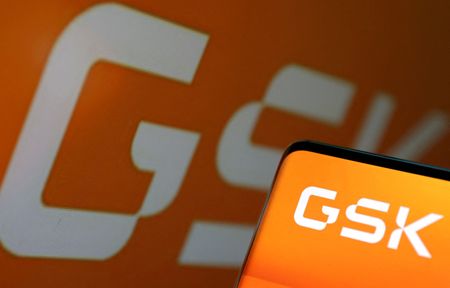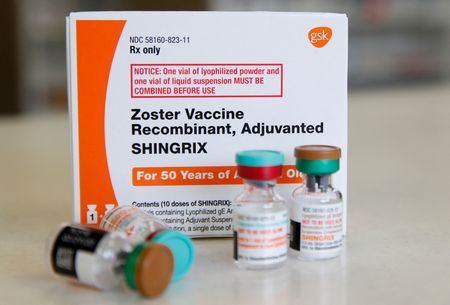By Natalie Grover
(Reuters) -GSK raised its 2022 forecast for the second time this year, after third-quarter earnings and sales topped estimates, continuing its strong start as a standalone prescription medicine and vaccine business since carving out its consumer health division.
After years of underperformance relative to its peers and missing out on the lucrative market for the first set of COVID-19 vaccines, GSK has delivered a string of strong results.
The latest is led by a record quarter for its blockbuster shingles vaccine Shingrix and higher-than-expected revenue from its COVID therapy, Xevudy.
Having survived a revolt by activist investors Elliott and Bluebell last year, GSK’s prospects since splitting off its consumer business earlier this year have been boosted by clinical trial success, though concerns around U.S. litigation over heartburn drug Zantac have spooked investors.
GSK shares hit a 2-1/2 month high of 1,470.2 pence in early trade on Wednesday, but were down 0.7% late afternoon, hitting their lowest point in the session.
GSK’s strong third quarter was somewhat expected, which could explain why the stock is not reacting strongly, Barclays analyst Emily Field told Reuters, highlighting that the Zantac overhang makes it difficult for new investors to get involved.
Thousands of lawsuits have been filed in the United States against a raft of drugmakers over allegations the heartburn drug contains a probable carcinogen.
GSK said it had incurred a charge of 45 million pounds in the third quarter, primarily reflecting provisions for increased legal fees related to Zantac.
“The business seems to be chugging along doing quite well, but I think that Zantac is just going to cap any near-term upside,” Field said. Originally marketed by a forerunner of GSK, Zantac has been sold by companies including Pfizer, Boehringer Ingelheim and Sanofi, as well as a handful of generic drugmakers. Shareholders fear a worst-case scenario where costs run into billions of dollars, as happened in cases involving Merck & Co’s painkiller Vioxx and Bayer’s glyphosate-based weedkiller.
THIRD QUARTER
Shingrix generated quarterly sales of 760 million pounds ($873 million), compared with the GSK-compiled analyst consensus forecast for 685 million pounds, with sales rebounding as COVID pressures have eased.
Xevudy handsomely beat expectations, raking in 411 million pounds in the quarter, well ahead of the GSK-compiled consensus of 60 million, helped by currency exchange movements making those sales more profitable than modelled by analysts.
However, the medicine has fallen out of favour in the arsenal of COVID-19 therapies on the basis that Omicron and the variant’s latest offshoots have likely rendered it obsolete.
On Wednesday, GSK said it anticipated that sales in its COVID-19 solutions business would be substantially lower going forward.
The British drugmaker now expects 2022 sales to rise between 8% and 10% and adjusted operating profit to increase by 15% to 17%, excluding any contributions from its COVID-19 solutions business. It is the second hike to the company’s initial full-year forecasts issued in February.
Meanwhile, GSK on Wednesday said it had secured priority regulatory review in the United States for its RSV vaccine, with a decision expected by early May.
The London-listed drugmaker is among a handful of companies racing to develop a vaccine for the respiratory virus, which causes thousands of hospitalisations and deaths each year.
If approved, the shots are expected to generate billions in sales for their makers, given the complex molecular structure of the virus and safety concerns have stymied protracted efforts to develop a vaccine.
($1 = 0.8707 pounds)
(Reporting by Natalie Grover in London; editing by Mark Potter, Jason Neely and Jane Merriman)


